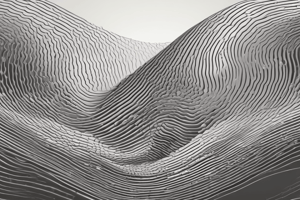Podcast
Questions and Answers
In the context of music production, what is the significance of acoustics?
In the context of music production, what is the significance of acoustics?
- It helps to create a pleasing aesthetic
- It shapes the quality of audio recordings (correct)
- It has no impact on music production
- It enhances the visual quality of audio recordings
What is reverberation in the context of acoustics?
What is reverberation in the context of acoustics?
- The absorption of sound energy by materials
- The amplification of specific frequencies
- The resonance of an object at its natural frequency
- The persistence of sound reflections in a space (correct)
What is the purpose of room treatment and acoustical design in music production?
What is the purpose of room treatment and acoustical design in music production?
- To create a visually appealing studio environment
- To minimize unwanted reflections and ensure accurate audio reproduction (correct)
- To change the natural frequency of objects
- To amplify sound waves
What is the initial phase of the recording process in music production?
What is the initial phase of the recording process in music production?
What is the role of resonance in acoustics?
What is the role of resonance in acoustics?
What is the result of sound absorption in acoustics?
What is the result of sound absorption in acoustics?
What is the significance of the cochlea's response to specific frequencies?
What is the significance of the cochlea's response to specific frequencies?
What determines the pitch of a sound wave?
What determines the pitch of a sound wave?
Through which medium does sound travel the fastest?
Through which medium does sound travel the fastest?
What is the function of the cochlea in the inner ear?
What is the function of the cochlea in the inner ear?
What is affected by the amplitude of a sound wave?
What is affected by the amplitude of a sound wave?
What is the function of the outer ear?
What is the function of the outer ear?
What is the distance between two consecutive points of similar sound pressure?
What is the distance between two consecutive points of similar sound pressure?
Where are sound vibrations amplified?
Where are sound vibrations amplified?
How do sound waves ultimately reach the brain?
How do sound waves ultimately reach the brain?
Flashcards are hidden until you start studying
Study Notes
Sound Waves and Their Characteristics
- Sound waves are vibrations that travel through a medium, such as air, water, or solids.
- The frequency of a sound wave determines its pitch, with higher frequencies resulting in higher-pitched sounds.
- The amplitude of a sound wave affects its loudness, with greater amplitudes producing louder noises.
- The wavelength of a sound wave is the distance between two consecutive points of similar sound pressure.
How Sound Waves Travel through Different Mediums
- Sound waves can travel through various mediums, including air, water, and solids.
- The speed of sound varies depending on the medium it travels through, with sound traveling faster in solids than in gases.
Relationship Between Frequency, Amplitude, and Perception
- The frequency of a sound wave is directly related to the pitch we perceive, with higher frequencies corresponding to higher pitches.
- The amplitude of a sound wave is linked to its loudness, where greater amplitudes result in louder sounds.
Hearing and Parts of the Ear
- Our ability to hear and perceive sound is facilitated by the complex structures of the human ear.
- The outer ear collects sound waves and funnels them towards the eardrum.
- The middle ear amplifies sound vibrations and transmits them to the inner ear.
- The inner ear houses the cochlea, a spiral-shaped organ responsible for converting sound waves into electrical signals.
Sound Collection and Transmission
- Sound waves are collected by the outer ear, amplified in the middle ear, and transmitted as electrical impulses to the brain via the auditory nerve.
- The brain processes these signals, allowing us to interpret and perceive different sounds.
Role of the Cochlea in Auditory Perception
- The cochlea plays a crucial role in auditory perception by converting mechanical vibrations into electrical signals that can be interpreted by the brain.
- Different regions of the cochlea respond to specific frequencies, enabling us to discern various pitches.
Acoustics
- Acoustics is the study of sound and its behavior in different environments.
- In the context of music production, acoustics plays a vital role in shaping the quality of audio recordings.
Importance of Acoustics in Music Production
- Acoustics influences how sound behaves in a given space, impacting the clarity, tone, and overall quality of music recordings.
- Understanding acoustics helps producers create optimal recording environments that enhance the sound of their productions.
Concepts in Acoustics
- Reverberation refers to the persistence of sound reflections in a space, affecting the perceived spaciousness of audio recordings.
- Resonance occurs when an object vibrates at its natural frequency in response to an external stimulus, amplifying specific frequencies.
- Sound absorption involves materials or objects absorbing sound energy, reducing reflections and improving sound clarity.
Impact of Room Size, Shape, and Materials
- The size, shape, and materials of a room can significantly affect sound quality by shaping how sound waves interact with the environment.
- Proper room treatment and acoustical design are essential for minimizing unwanted reflections and ensuring accurate audio reproduction.
The Recording Process
- The recording process is a crucial part of music production, involving several key steps: pre-production, tracking, mixing, and mastering.
- Preparation involves planning the recording session, setting goals, choosing the right instruments, and preparing the studio environment.
- Recording involves the actual recording of musicians performing their parts.
Studying That Suits You
Use AI to generate personalized quizzes and flashcards to suit your learning preferences.




